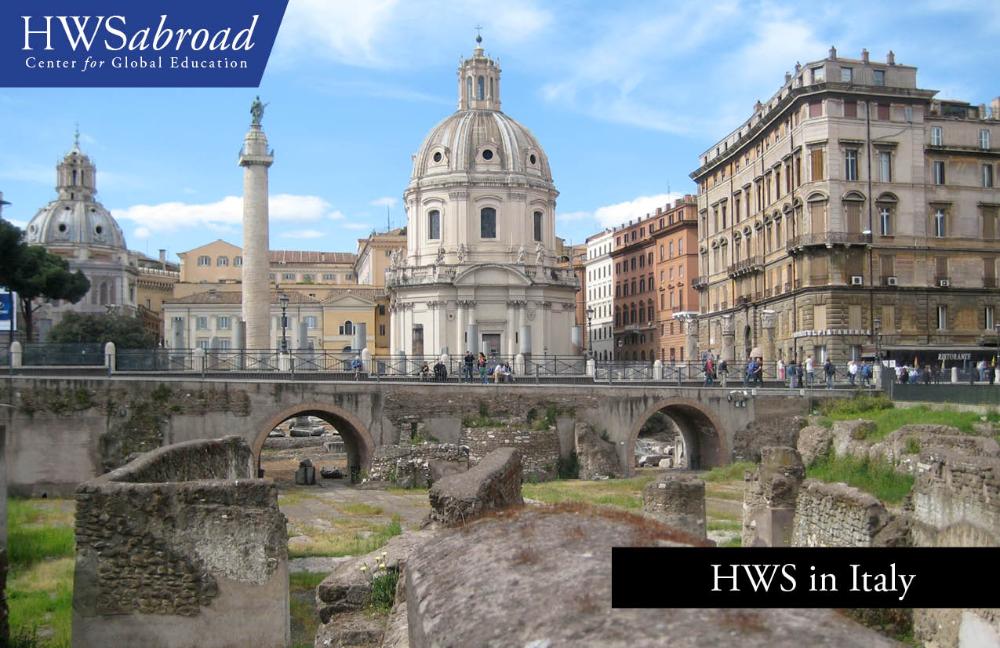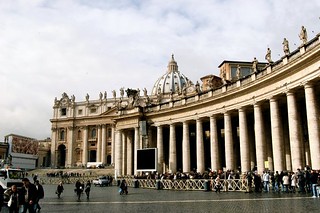
Rome, Italy
Rome exhibits layers of history going back over two millennia—Etruscan tombs, Republican meeting rooms, imperial temples, early Christian churches, medieval bell towers, Renaissance palaces, and baroque basilicas—but it is also a very modern, vibrant, multicultural city.
In this one locale, a phenomenal concentration of history, legend and monuments coexists with an equally phenomenal concentration of people busily going about their everyday lives.
While tourists visit the Vatican, the Forum Romanum and the Trevi Fountain, many visitors often miss the many other sights that make the whole of Rome a museum—a living museum with a population of three million, with rich art, literary, music, theatre, and food traditions.
About the Program
The HWS program in Rome, Italy utilizes an interdisciplinary approach to explore different aspects of Italian culture and society. While the program is designed to immerse students fully in the experience of being in Rome, excursions will provide a wider perspective on the history, culture, and daily life of Italy as a whole. Students will live in furnished flats, providing opportunities to develop their Italian language skills and to experience Roman daily life.
Courses and program-related activities are arranged through our affiliation with the Scuola Leonardo da Vinci, one of the leading language schools in Italy, and the Gustolab Institute.
Students participating in the program will take the following courses:
Exploring Culture Through Food (1 credit)
The saying "A tavola non s'invecchia" ("One doesn't age at the supper table") expresses the importance of food and eating for Italians. In this course we will use anthropological tools to study sociocultural meanings, practices, histories, politics, and economics of the foods Italian people eat and produce. The course will pay particular attention to the literal and figurative terroir (earth, place) in Italy, where we will be learning about culinary production and consumption of fruits of the soil. We will seek to understand how the foods people consume (and those they do not) provide more than simply nourishment - they help to constitute social identities and group formation. Worldwide, humans use the social "taste" of food to define and enforce class, race, and gender parameters. How do Italian eaters, cooks, and food producers and purveyors construct these categories - and how have these categories, when related to food, changed over time?
We will study regional and class differences in cuisine; gender roles and constraints; politics of the Italy-originated Slow Food movement; and meanings constructed through claims of culinary authenticity. Whever possible, our classroom will be in the city: the restaurant tables, kitchens, and chopping blocks of Rome and the other Italian destinations we visit.
ITAL 102: Beginning Italian II (1 credit)
Offered through our partner institution, the Scuola Leonardo da Vinci, this course will build upon the foundation of Italian language study completed at HWS prior to the program. A variety of visits to local sites will complement in-class instruction and a series of “labs” will introduce students to various aspects of Italian culture and society. Students with more advanced Italian skills will be placed in an upper level class.
Terra Italiana: Environmental Studies in Italy (1 credit)
Can you envision a land conservation project that requires human habitation to succeed? What about anti-poverty farming efforts that reject genetically engineered rice kernals because they yielded too much rice in relation to available water resources? In this course, we will question conventional perceptions of the relationship between humans and nature as we study how the ecological environment is shaped by human behavior - and vice-versa. We will use an anthropologival approach to study both local and global as we become acquainted with perspectives on how humans perceive, exploit, and socialize natural environments. Once we have established core knowledge about how human beings live and work in the environment, we will study a series of case studies focused on Italian places and practices including the environmental impacts of tourism in Rome, Slow Food and the conservation of agrobiodiversity, and indigeneity and the politics of land claims in Sardinia.
Sustainable Rome (1 credit)
This course will examine Italian culture and society through the perspective of sustainability. Students will be introduced to Italy and its regional traditions and will explore contemporary issues of sustainability related to urban space, waste, energy, mobility, water, and agriculture with lessons devoted to the success of the Mediterranean diet, food production, distribution, and consumption, as well as the ways in which architecture and design of the built environment can contribute to (or impede) the preservation of cultural heritage
Rome will serve as a laboratory for studying urban sustainability in an increasingly urban world in which cities account for the vast majority of the world’s wealth and population growth, as well as its energy use. Amidst the urgent clamor to redesign urban environments, we will look at not only technological solutions and “smart cities” strategies but also traditional approaches to improving social, economic, and environmental conditions. Other topics that will be explored include new trends in urban agriculture, community gardens and activist movements such as “guerrilla gardening”, advanced integrated urban agriculture systems on the roofs and facades of buildings, and innovative projects for mini and macro food-scapes that can efficiently deliver high-quality products and help address problems of food security.
Through the course, students will develop a rich understanding of the operational technologies of cities and a critical attitude towards the negative impact these technologies have on our environment.
ACADEMIC FOCUS
This program will be of particular interest to students in Anthropology, Environmental Studies, International Relations, Sociology, and Entrepreneurial Studies as well as those in European Studies focusing on Italy.
This program is open to all sophomores, juniors, and seniors in good social and academic standing with a minimum GPA of 2.5. Students will be required to have successfully completed (with a C- or better) ITAL 101 prior to departure. Due to the challenging nature of study abroad, student academic and disciplinary records will be carefully screened.
Students reside in independent apartments arranged by the program while in Rome and will stay in hotels or hostels during excursions.
Program-related excursions vary from year to year depending on the courses offered and the interests of the faculty director(s). The program typically includes a combination of overnight excursions outside Rome, designed to provide students insight into other areas of the country, and day trips to important sites in and around Rome. Visits to Venice in the north and Calabria in the south are tentatively planned for Fall 2023.
Students will be charged standard HWS tuition and fees, room fees, and a $600 administrative fee. This will cover tuition for a four-course semester, health insurance, housing, and program-related activities and excursions. Note that no HWS board fee will be charged. Students should plan to bring their board fee to cover meal expenses throughout the program. While meal expenses will vary according to individual tastes, we estimate $2200-$2400 should be sufficient for students who prepare their own meals.
Additional expenses not covered include airfare, visa, books, and personal expenses (laundry, entertainment, ground transportation, and independent travel). We estimate airfare for this program at $1000-$1200 from the East Coast, visa at $50, and books at $250. It is difficult to give an accurate estimate of personal expenses because student spending habits differ considerably. We would suggest a minimum of $1500 above and beyond meal expenses. However, students on a tight budget should be able to manage with less. If you are concerned about finances we strongly encourage you to talk to the CGE staff who can offer information and advice based on your specific situation.
HWS students must complete all components of the Global Education application in order to be considered for admission to this program.
-
The Rome program is offered every semester. In the Fall semester the academic focus will vary depending upon the expertise of the faculty director(s) while Art and Architecture is the focus in the Spring semester.
-
All components of the application must be submitted online by the published deadline. Specific deadline dates are set each semester and will be in late September/early October (for Fall programs) and late February/early March (for Spring programs).
Program Handbook
IMPORTANT: The handbook(s) below is/are the most recent handbook(s) published for this program. A new version, with updated information, will be made available each semester. Program participants will receive their updated handbook approximately 2-3 months prior to their program’s start date.
FALL HANDBOOK
Please DO NOT MAKE TRAVEL ARRANGEMENTS until you have received final confirmation of the program start/finish dates for the specific semester you are attending. Dates included in versions of the program handbook intended for previous semesters do not necessarily apply to future programs.
NOTE: The information above is subject to change. Please see the CGE for more information.
Resources for Smart Travelers
Rick Steve's Packing Tips!

